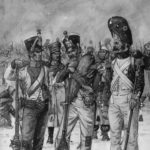Napoleon Bonaparte?
When I (Danita here) first became interested in ferreting out the Zanrè family history, I was fixated on confirming or denying the veracity of a family tale. You see, the UK Zanrès (especially those in Scotland) had a family legend that suggested that around 1795 to 1800 a large number of soldiers in Napoleon Bonaparte’s army had broken ranks in Northern Italy. These men were completely spent, hungry with no food and barely alive. Two young Zanrè brothers who were part of Napoleon’s troops settled in the Apennine Mountains near the the Taro Valley. They must have found work, then finally met some young women from the area and the rest is history.
Giuseppe Zanrè’s family had further lent some credence to this idea. He was part of a traveling party from Italy to the UK in 1896, at the young age of 8, even though his parents were not part of this migration! One of the reasons given for his joining this traveling party, walking though Europe at such a young age, was that “he could speak French” which would come in handy during the journey. The story goes that he had an aunt in Marseilles, and that he had been there frequently as a child.
Additionally, when Domenico Zanrè was to marry Francesca Maria Giulianotti, she was admonished by family and friends “not to marry that Frenchman”. For the far flung Zanrè descendants, not well familiar with the family history, there was a lot of circumstantial evidence that Zanrè wasn’t really an Italian name, and that the Zanrè just appeared in the High Valtaro out of nowhere in the late 1700s.
Our first indication that this was “iffy” was found in 2014, when the priest at San Rocco produced church records of the birth of Domenico Antonio Zanrè, who was born in San Vincenzo in April, 1798. Napoleon became the leader of the “Army of Italy” in October, 1796, just a scant 18 months prior. Not impossible – all is fair in love and war! But it was starting to seem a bit of a stretch. However, there was no other information to be had, and so we were still inclined to believe that such a legend could be possible!
After we (Danita and Joe) moved to BorgoTaro in 2016, we took a trip up to San Vincenzo to look at church records. The 1796 birth record was found, and the priest allowed us to take pictures of a number of other pages. It was in perusing these records that we found the fatal blow to this particular legend. In 1783, Astatore Zanrè, father to Domenico Antonio above, was listed as a member of the local parish in San Vincenzo, and as the godfather of Maria Zanrè’s daughter Domenica. Well, so much for Napoleon!!! But where did Astatore come from, and what is this “French connection” that seems to run through this particular branch of the story?
Well, Astatore was born in these same hills. During Covid lockdowns I spent many days/weeks/month digging through church records, and we now have verified Zanrè ancestors born back to 1616. The earliest Zanrè record I’ve found is discussed in the Who came before Sentino post (spoiler – it’s in 1569) . So why does there seem to be this French connection running through the family lore? Maybe his branch of the Zanrè family was more aligned with the French during the Napoleonic rule than was generally approved of by the locals. At this point, we simply do not know what these references to being “French” are related to.
What we DO know, however, is that if some French soldiers wandered into the mountains near San Vincenzo, they were not directly responsible for Astatore’s branch of the family, and they likely already knew that other Zanrès were there!


This is great info. I always wondered about this connection!
Pingback:Who came before Sentino? – History of the Zanrè Family